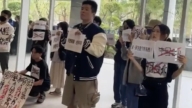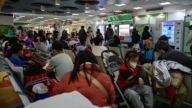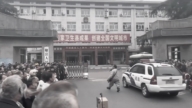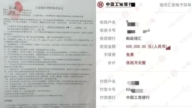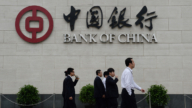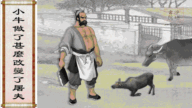【新唐人2011年12月10日讯】中国11月份居民消费价格指数(CPI)同比涨幅大幅回落到4.2%,低于10月份的5.5%,创下14个月以来最低水平。而一些分析师认为,11月份通货膨胀率大幅下降,低于预期,为决策层货币政策微调提供了空间。但是,中共政府的通胀数据真实性却遭到专家和民众的普遍质疑。
北京国家统计局12月9号公布,11月份全国居民消费价格CPI比去年同期上涨4.2%,其中,食品价格上涨8.8%,消费品价格上涨5.0%,服务项目价格上涨2.4%。1到11月平均CPI比去年同期上涨5.5%,是14个月以来的最低水平。
而《华尔街日报》所作的网络调查显示,87%的网民指出,中国的物价没有下降。
《强国论坛》的网友们说:“蔬菜价格11月份上涨幅度比较大,降的只能是极个别的地方如山东的大白菜,内蒙的土豆,别的降了吗!CPI中食品价格上涨还是很快,这是老百姓天天能感觉到的。”
财经评论家草庵居士向《新唐人》表示,中共政府不敢公布真实的通胀数据。
草庵居士:“中共的两个解释实际上是掩耳盗铃的一个东西,中国实际上的通货膨胀要远比现在的CPI要严重的多。中国第三季度我们看到,整个的名义上GDP增长率大约在22%左右,但它的实际GDP增长率只有6%左右,所以,中国真正的通货膨胀大约在16%左右。”
从11月份制造业采购经理指数(PMI)跌到临界点下方;到最新数据显示11月份的工业和投资也继续放缓,都表明中国经济在内外因素夹击下慢慢降温。
不过,《路透社》援引分析师的看法认为,这种降温是“政策主动调控”的结果,在意料之中,而且11月份消费回升暗示内需稳健,这对中国经济增长保持平稳,避免“硬着陆”将起到重要作用。
英国《BBC》说,许多分析人士预计,保增长将是中国政府的首要目标,在继下调存款准备金率后,未来数周内,大陆央行很可能采取更多放宽政策。
“中银国际”首席经济学家曹远征则认为,中国经济面临的硬着陆风险仍不容小觑,物价水平不会大幅下降。为此,明年全年的货币政策主基调仍将以稳健为主,局部政策微调仍将成为可能。
“中国人民大学”财政与税收研究所副所长吕冰洋指出,政府的“财政扩张”是中国经济失衡的重要原因,以“商品税”为主的税制结构,让居民不敢多消费,促使收入分配向政府和国有企业倾斜。
“北京天则经济研究所”副所长冯兴元向《新唐人》表示,这就造成了“国进民退”的现象,严重阻碍了经济增长方式的转型。
冯兴元:“货币政策走向稳健、信贷控制要放松一点是正常的,关键是它现在还是财政扩张支出太厉害。那么,总体上需要减少管制,甚至减税,推行普适性的竞争政策,而不是不断的搞产业政策等等,就是要改善竞争环境、生存环境。”
备受关注的中央经济工作会议即将召开,专家们普遍预计,稳健货币的政策基调明年仍会延续,经济工作重心将落在稳增长、抑通胀和调结构。
新唐人记者常春、李元翰、萧宇采访报导。
China’s November CPI Eases to 4.2%, People Questioned
China’s consumer price index (CPI) growth rate eased to 4.2%
year-on-year in November, which is lower than October’s 5.5%, and is the lowest in 14 months.
Some analysts said the November inflation rate had dropped
significantly, reaching a lower level than expected,
giving space for decision-makers to change the monetary policy.
But experts and others questioned the truth of the data.
Beijing National Bureau of Statistics released the news on Dec. 9
that compared with the past year, November’s CPI rose 4.2%.
Within it, food prices rose 8.8%, consumer prices rose 5.0%,
service prices rose 2.4%.
In the first 11 months of this year, the average monthly CPI increased by 5.5%.
November’s CPI rising rate is the lowest in the last 14 months.
Wall Street Journal did an online survey which showed that
87% of Chinese netizens didn’t feel that the cost of living had decreased.
Netizens said on Strong Nation Forum: “The price of
vegetables has increased sharply.
Only certain foods have decreased in some areas for example
cabbage in Shandong province, potato in Inner Mongolia.
Has there been any other price decrease?”
“Food prices have increased very quickly,
that is something that people can feel in their daily lives .”
Cao’an Jushi, an economic commentator told NTD, the Chinese
government doesn’t dare to publish the real inflation data.
Cao’an Jushi:”Two explanations by CCP are actually
self-deceiving.
In fact, the inflation is much more serious than the CPI that
the CCP has published.
In the third quarter, China’s GDP was said to have increased
by 22%, but actually it’s about 6%. So, the real inflation in China is about 16%.”
China ‘s November manufacturing Purchasing Managers’
Index (PMI) fell below the critical point.
The newest data shows that the November industry and
investment has continued to slow down.
All of these figures show that the Chinese economy
is cooling down with inside and outside factors.
However, Reuters has quoted an analyst’s view that this
cooling is a result of “policy active control" which can be expected.
Consumption increase in Nov. shows domestic demand is
stable, which is important for the Chinese economy to remain steady, and to avoid a “hard landing”.
The has BBC said that, many analysts have estimated that ensuring growth
is the first priority of Chinese government.
After reducing the deposit reserve ratio, China central bank is likely to take
more relaxed policies in the next few weeks.
Cao Yuanzheng, chief economist of Bank of China thinks that,
there’s still a big risk that the Chinese economy will have a “hard landing”, and that the price level will not decline.
So, the monetary policy will be based on stabilizing next year,
and it’s possible that there will be some light adjustment in some parts.
Lu Bingyang, the deputy director of Finance & Tax Institute,
at the China Renmin University pointed out that
the main reason for the Chinese economy’s imbalance is
the government’s “fiscal expansion” policy.
It set up a commodity – based tax system in which people
don’t dare to spend, as well as an income distribution which benefits the government and state-owned enterprises.
Feng Xingyuan, the deputy director of Beijing Tianze Economic
Institute told NTD that
the policy had created the phenomenon of “ state-owned
businesses expanding and the private sector shrinking ”,
which in turn blocks the transformation of
the economy’s growth mode.
Feng Xingyuan: “If monetary policy is to be more stable,
It be better to loosen credit control a little.
The key is that the Chinese government’s fiscal spending
has expanded too much.
Then, overall there is a need for the government to reduce
control, or even to apply tax decreasing.
There is need for a universal competition policy,
rather than continuous engagement in industrial policy,
which means that there is a need to improve the competitive
and living environment.”
The most important Central Economic Work Conference will
be held soon, and experts are expecting that
the steady tone of monetary policy will continue next year,
and that the economic focus will be on steady economic growth, curbing inflation and structural adjustment.
NTD Reporters: Chang Chun, Li Yuanhan and Xiao Yu





